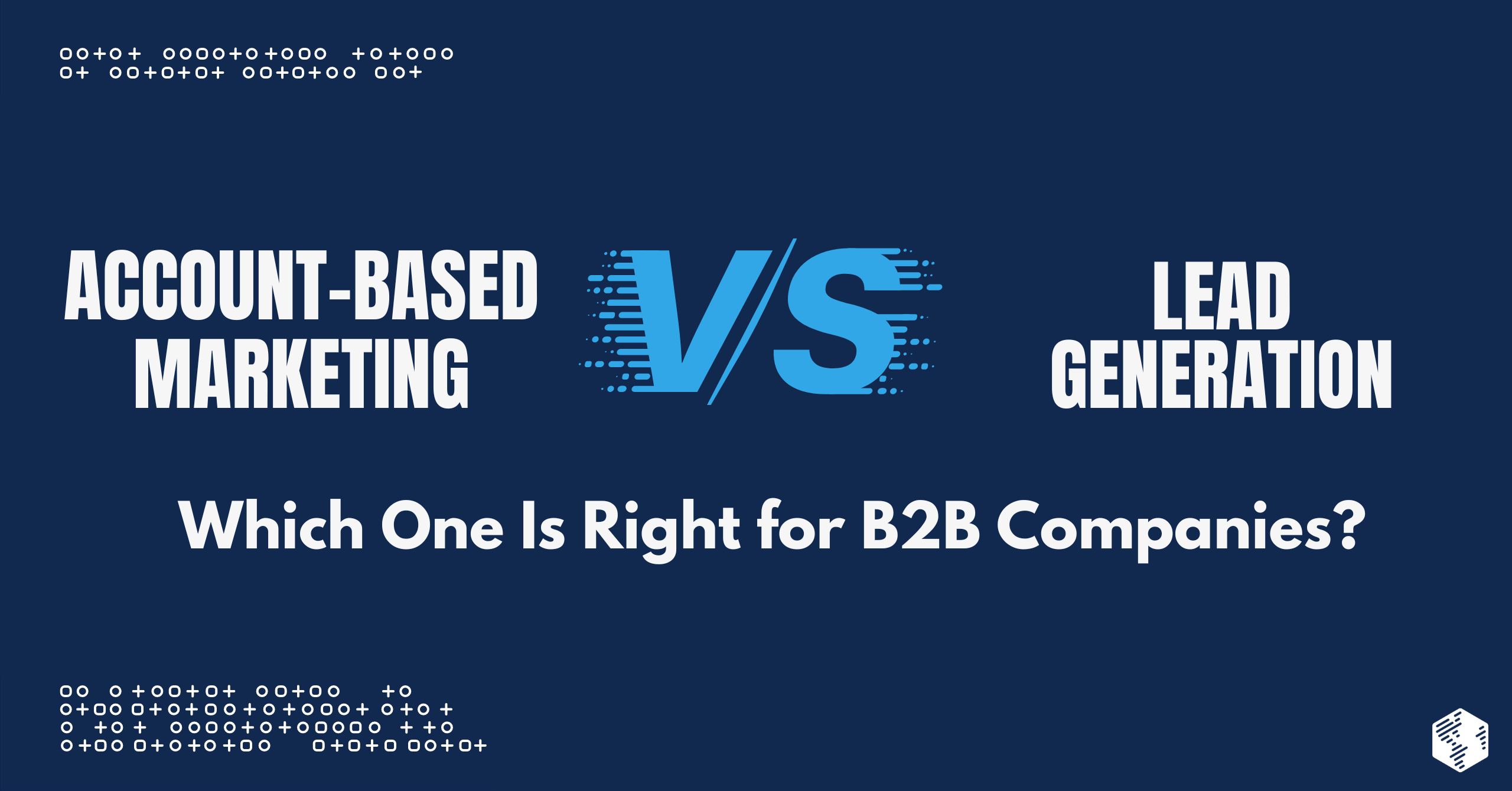Table Of Contents
The business-to-business (B2B) marketing landscape is constantly evolving—from the best practices marketers recommend to the technology buyers are expecting companies to use. Your B2B digital marketing strategy must consider how to meet the changing needs of your industry, niche, and audience.
For years, one of the most popular approaches to digital marketing was centered around lead generation. However, a newer method—account-based marketing—is becoming more and more common.
To keep up with an evolving digital world and meet the needs of buyers, B2B marketers across a variety of industries have been exploring which of these strategies work best for their company, and it’s time for your organization to make the same decision.
What Is B2B Lead Generation?
A lead refers to an individual at a company who has purchasing power—in other words, someone who could be turned into a paying customer. Lead generation is the process of identifying prospective leads and nurturing their interest in your products or services.
The traditional sales funnel starts with generating as many leads as possible by creating content that appeals to your audience, reaching out to potential buyers, and otherwise getting prospects interested in your B2B company. Then, your marketing team guides the lead through the sales funnel until they are ready to be passed onto the sales team and converted into a customer. Some leads will drop off at various points, but by starting with a higher number of leads, a larger quantity will get to the end of the funnel and make a purchase.
Finding qualified leads—prospects who are most likely to become customers—is key to the lead generation process.
As your marketing team observes the online behavior of prospects, they will look for people who fit the profile of an ideal customer. These marketing qualified leads (MQLs) have the potential to make a purchasing decision if they are nurtured properly. Sales qualified leads (SQLs) are leads who have expressed interest in your products or services and are ready to talk to a sales representative.
Both MQLs and SQLs are essential to developing an effective lead generation strategy and sales pipeline.
What Is Account-Based Marketing?
Account-based marketing, alternatively, is based on quality over quantity. This approach involves targeting high-value individuals with personalized content that speaks directly to the needs of their company and following them closely throughout the buyer’s journey.
By treating each targeted account (the high-value organization) as its own market, account-based marketing allows you to create custom campaigns and messages for key decision-makers at those ideal companies, leading to a much higher return on investment (ROI) than other marketing methods.
A successful account-based marketing strategy requires careful data management, a high degree of personalization, and a collaborative effort between the marketing and sales departments.
Account-Based Marketing vs. Lead Generation: 7 Key Differences
As you decide which approach makes the most sense for your B2B company, keep these key differences between account-based marketing and lead generation in mind.

Lead Focus
Account-based marketing and lead generation have different approaches to finding leads.
Lead generation: With traditional lead generation methods, your goal is to gather as many leads as possible from your target audience, guide them into the sales funnel, and nurture them until you are left with a few highly-qualified leads that you can pass along to the sales team.
Account-based marketing: An account-based marketing approach requires leads to be carefully selected, prioritizing high-value targets and building customized marketing campaigns for those key leads.
The lead focus of these strategies can be summarized as more leads (lead generation) vs. better leads (account-based marketing).
Audience
Lead generation: The aim is to reach as many buyers in your target audience as possible, sharing content and building brand identity in the hopes that prospects will be interested in your company’s products or services and, hopefully, enter the sales funnel. This target audience is defined by buyer’s personas.
Account-based marketing: The audience is the target accounts themselves—the ideal companies or organizations your B2B business wants to work with. After identifying target accounts, you can then discover who has the power to make a purchasing decision on behalf of the account and start developing a relationship with them.
Departmental Relationships
Lead generation: The traditional sales funnel leaves lead generation in the hands of the marketing department while lead conversion is the responsibility of the sales team. The departments interact when marketing hands off qualified leads to sales, but otherwise, the teams work separately.
Account-based marketing: This strategy is the opposite; it works best when your marketing and sales departments are closely aligned and working together from the start to engage with key decision-makers at target accounts.
Scalability
Lead generation: Designed to reach a wider audience, so they are easier to scale to meet the growing needs of your B2B company.
Account-based marketing: Requires so much time and effort to target leads and personalize content that it tends to be less scalable than lead generation or other traditional methods.
Channels
These two methods make use of different marketing channels to share content with target audiences.
Lead generation: Gets results when B2B marketers use organic channels to cast a wide net, sharing content anywhere from social media to articles to blog posts.
Account-based marketing: A more direct approach, so it makes sense to use email, social media messages, in-person interactions, appointment setting, and other direct interactions instead.
Personalization
Lead generation: Content is intended to appeal to a wide audience so that you can drive as many leads into the sales funnel as possible; in other words, lead generation content tends to be more generic.
Account-based marketing: Requires a high level of personalization. The content must feel relevant and helpful to key decision-makers of the accounts you are targeting.
Metrics
Lead generation: Focuses on metrics like clicks, page views, and impressions. However, while these numbers may inform you of how many people are engaging with your content, they don’t reveal if your content is reaching the right people from the right companies at the right time.
Account-based marketing: Includes key performance indicators (KPIs) that demonstrate if your marketing efforts are driving meaningful results with target accounts. For example, using a marketing analytics or search engine optimization (SEO) tool, you can measure website traffic from target accounts and calculate how much time individuals from those ideal companies are engaging with your company.
Account-Based Marketing vs. Demand Generation vs. Lead Generation
Other than account-based marketing and lead generation, you may hear about demand generation. These strategies are related in that their goals are to make the sale, convert prospects to customers, and boost ROI. However, they differ in their approach.
Demand generation is the process of increasing brand awareness, generating attention for your products or services, and growing your audience. Its purpose is to build interest in your company and make your target audience want to buy from you—compared to lead generation, which focuses on converting your audience into qualified leads. These strategies often work in tandem, with demand generation at the top of the traditional sales funnel and lead generation at the bottom.
Account-based marketing, on the other hand, is less about creating demand and more about developing relationships with targeted accounts, either one-on-one or via smaller segments.
Lead generation, demand generation, and account-based marketing can all be successfully incorporated into your B2B company’s digital marketing strategy.
Which Is Right for Your B2B Company: Account-Based Marketing vs. Lead Generation?
When it’s time to choose between account-based marketing and lead generation, how do you decide which method is right for your B2B business?
Despite the many differences between these two approaches, you don’t have to choose one or the other. Both account-based marketing and lead generation can (and likely should) work hand-in-hand to get customers for your organization.
For example, a lead generation marketing campaign will help your B2B company constantly discover and nurture new batches of leads; then, you can determine which of those leads belong to organizations that might be good candidates for a target account. That’s when account-based marketing efforts come into play.
Account-based marketing and lead generation can complement each other. Once you determine the situations in which each is best suited for, you can incorporate both of these methods into your digital marketing strategy.
OneIMS: A Full-Service B2B Digital Marketing Agency
Together, account-based marketing and lead generation can help your B2B organization get more customers, pursue new revenue opportunities, and increase your ROI.
And, whether you want to incorporate account-based marketing into your current inbound marketing strategy or build a new digital marketing framework from the ground up, we can help.
OneIMS is a full-service digital marketing agency that specializes in helping B2B organizations develop, implement, and measure data-driven marketing campaigns. Our team of digital marketing experts is ready to help your company streamline your marketing efforts and work more efficiently. We have the strategies, solutions, and tools you need to launch a new B2B marketing strategy that will transform your business into a revenue-generating machine.
We have a long history of working with companies in a variety of industries to develop innovative and data-driven marketing solutions. We pride ourselves on producing measurable and sustainable results.
But you don’t have to take our word for it. View testimonials from our clients and read our blog to get an idea of our training, experience, and track record of success.
Are you ready to take the next step in generating more traffic and optimizing your digital presence? Schedule a consultation with us today to get started.






